Uhuru Kenyatta has vowed to overcome Kenya's divisions after being sworn in for a second term as president, at a ceremony boycotted by the opposition.
Speaking after his inauguration in the capital Nairobi, he said he would try to incorporate some of the opposition's ideas "in the spirit of inclusivity".
At least one man was killed when police clashed with opposition supporters.
Opposition leader Raila Odinga has announced plans to be sworn in himself as president next month.
He boycotted last month's repeat election and has not recognised Mr Kenyatta's victory.
Mr Kenyatta was officially re-elected with 98% of the vote on 26 October but just under 39% of voters turned out.
The original election on 8 August was held again after being annulled by the Supreme Court on grounds of irregularities.
Embarking on his second and last term in office, he promised to act as "the custodian of the dreams of all" Kenyans.
Without specifying whether he would reach out to Mr Odinga, he said: "We may have chosen different candidates and different visions, but each one of us voted for a better life.
"To my competitors, and in the spirit of inclusivity, I will endeavour to incorporate some of their ideas. The election was not a contest between a good dream and a bad dream. It was a contest between two competing visions.
"I will devote my time and energy to build bridges, to unite and bring prosperity to all Kenyans."
How did the inauguration unfold?
Spectators inside Nairobi's Kasarani sports stadium were entertained by music and dance performances, while the military paraded.
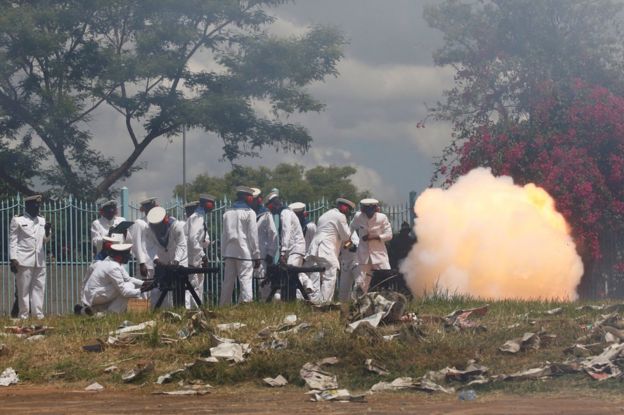
A cannon salute was fired
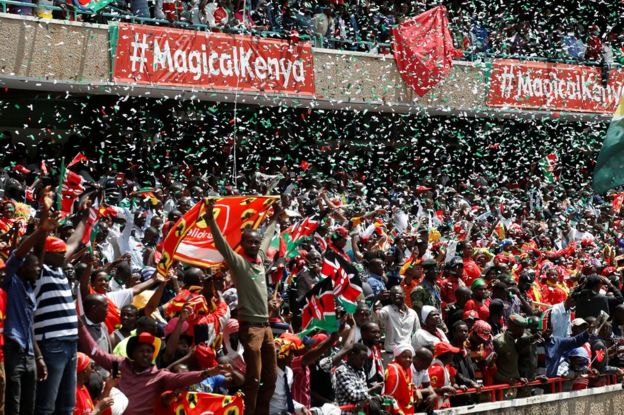
The stadium was packed with supporters
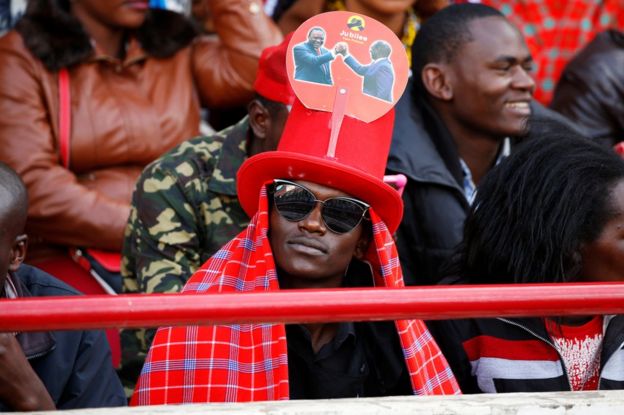
The luckier Kenyatta supporters had seats inside the stadium
However, there were scenes of chaos outside when people without seats tried to rush in and were driven back by police with tear gas and batons, with some officers on horseback.
Big screens had been promised so that tens of thousands of people could watch the ceremony from outside the stadium but no screens were provided, AFP news agency reports.
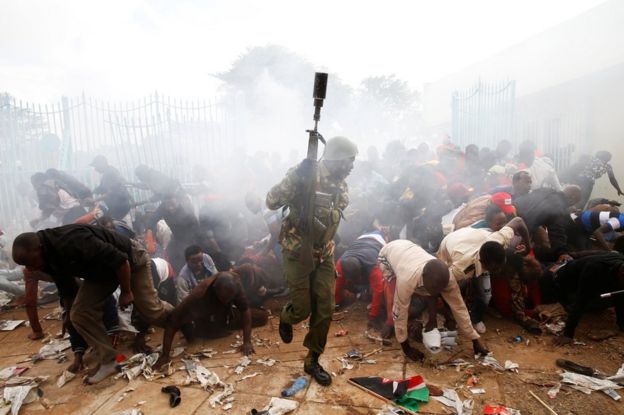
People fell down as police fired tear gas outside the stadium
Which foreign leaders attended?
Ethiopian Prime Minister Hailemariam Desalegn and Rwandan President Paul Kagame were among a number of African leaders at the inauguration.
Why was the election re-run?
Chief Justice David Maraga said the August election had not been "conducted in accordance with the constitution" and declared it "invalid, null and void".
The Supreme Court ruled that the result had been "neither transparent nor verifiable".
But Mr Odinga urged his supporters to boycott the second vote because he said no reforms had been made to the electoral commission since the original poll.
Correspondents say the election dispute has left Kenya deeply divided.
About 50 people are reported to have been killed in violence since the August ballot.
Burning tyres
By Anne Soy, BBC News, Nairobi
There were confrontations between police and opposition supporters in the suburb of Doonholm.
Angry protesters lit tyres, barricaded roads and threw stones at the police and some ruling party supporters. "No Raila, no peace," they shouted as police lobbed tear gas canisters to disperse them.
"We do not recognise Uhuru Kenyatta," one protester holding a sling loaded with a stone told me. Another protester said he was angry that the police had blocked access to the venue where the opposition had planned to hold a rally.
Mr Odinga told the BBC that they wanted to mourn the death of their supporters who were allegedly killed by police over the past week-and-a-half. The police have denied shooting and killing any opposition supporters.
How are the opposition responding?
Addressing his supporters on a road in Nairobi, Mr Odinga said he himself would be sworn in as president on 12 December.
According to Mr Odinga, Mr Kenyatta was elected by "just a small section of the country".
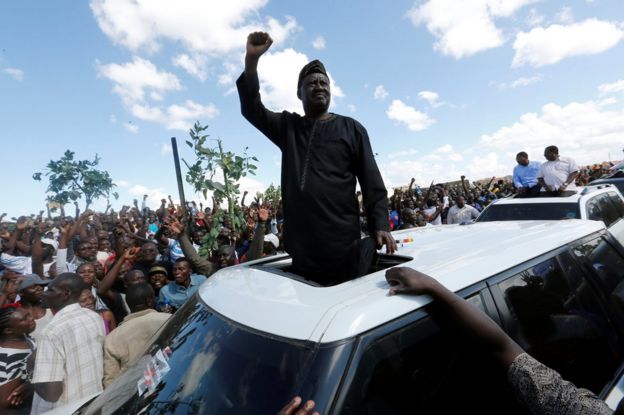
Raila Odinga greeted his supporters from the sunroof of a car
A photographer for Reuters news agency took photos of a crowd surrounding the body of a man said to have been killed by a stray bullet in a clash with police.
In the opposition stronghold of Kisumu, in the west of the country, local people told BBC News they were not happy with the inauguration.
"I am going to peacefully accept and move on but I won't recognise this presidency," said one man.
A woman said Mr Kenyatta had not won fairly. "So we feel that it's not time to move on," she said. "It will not be an easy thing to do."
Latest Stories
-
Local government expert opposes gov’t decision to give drought food to SHSs
5 minutes -
Your work inspired confidence in Ghana’s economic future – IMF MD to Dr. Amin Adam
11 minutes -
Bawku conflict: “Sending a sheep to a china shop” approach cannot resolve it – Security analyst
45 minutes -
Joseph Victor Amoah: An unsung creative behind Ghana’s top gospel hits
48 minutes -
Kofi Adomah shot in his eye during firing of musketry, undergoing urgent treatment
57 minutes -
We’re sorry for disappointing all who supported us – Justin Kodua on NPP defeat
58 minutes -
GCB Bank PLC partners with University of Ghana Hospital to construct paediatric centre
1 hour -
Rev Steve Mensah endorses Asempa FM’s Ekosiisen as the best current affairs show
2 hours -
Prisca Abah: Ghana’s modeling powerhouse shines in Big8 Girls Project
2 hours -
We’re still shocked by the results of the parliamentary elections – Justin Kodua
2 hours -
Hypertension, diabetes, alcohol consumption among silent killer diseases in Ghana – Report
2 hours -
I’ll marry again – Joyce Blessing opens up on her dating life
3 hours -
Illness, mental health, other factors fuel worker absenteeism in Ghana – Report
3 hours -
Boycott any invitation from ORAL team – Minority to former gov’t officials
3 hours -
NDC’s Chief Kwamigah congratulates Volta regional minister-designate
3 hours

